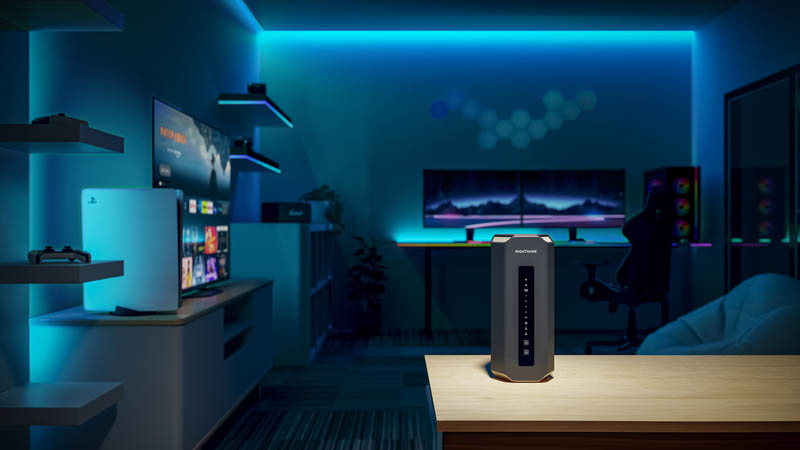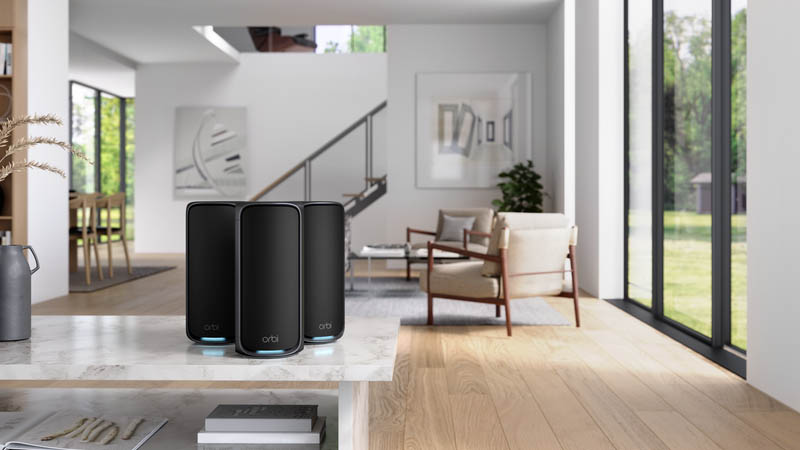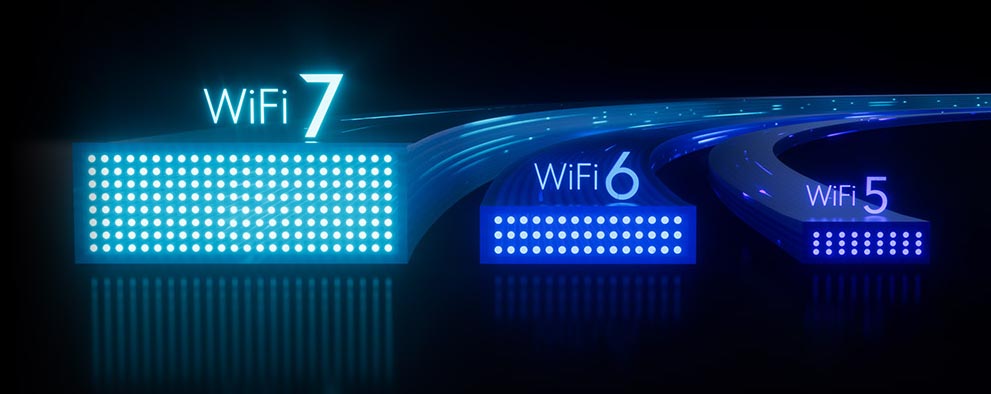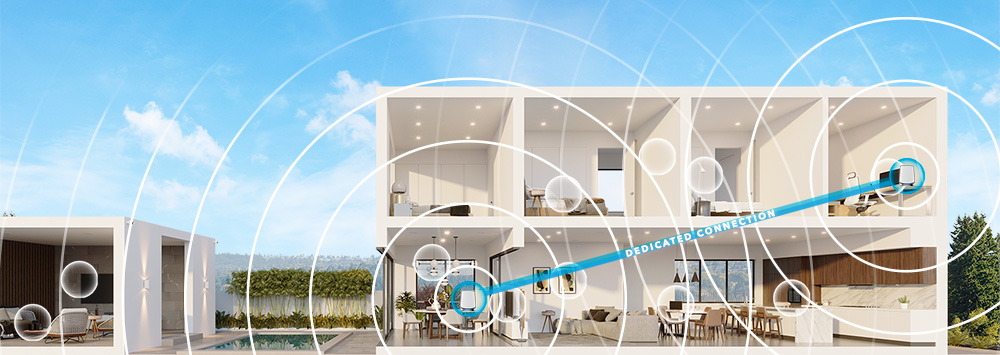A traditional WiFi router connects to your modem and delivers internet to your devices by producing WiFi and is limited to its WiFi range. On the other hand, Mesh Systems use a combination of a Mesh Router that connects to one or more satellites or nodes to produce WiFi from each unit. This allows the system to expand WiFi coverage throughout your home, without negatively impacting WiFi performance. For more on this topic consider visiting Orbi Mesh Systems vs. Nighthawk Routers.
This guide will help you decide which option suits your needs best, ensuring you stay connected everywhere in your home.
IN THIS ARTICLE
- Understanding WiFi Technology Options
- Introduction to Router Technology
- Mesh WiFi Technology to the Rescue
- Mesh WiFi vs Router Performance - How to Choose?
- What is a Challenging WiFi Environment?
- Check-list - Use Cases for Routers and Mesh Systems
- NETGEAR Nighthawk Router Performance
- NETGEAR Orbi Whole-Home Mesh System Performance
- Introduction to WiFi 7 for Routers and Mesh Systems
- Routers and Mesh System Summary
- Practical Advice for Choosing Between Router and Mesh
- Explore More NETGEAR Routers and Mesh Systems
Understanding WiFi Technology Options
Let’s dive into the basics of WiFi technologies to help you make an informed choice.
A single router connects to your modem and manages the internet connection provided by your ISP. This setup works well for many homes, especially smaller ones.
However, since around 2015, mesh routers have become increasingly popular. These systems include a main router and one or more satellites, or nodes, strategically placed around your home. Typically, you’ll start with at least two satellites, with the flexibility to add more for even greater coverage.
Unlike traditional WiFi extenders, mesh systems ensure consistent and reliable speeds, no matter how far you are from the main router. This means you can enjoy seamless internet access throughout your large or multi-story home, and even in your yard, without any slowdowns. Whether you’re streaming in the living room or working in a home office upstairs, a mesh system has you covered.
So a traditional WiFi router might be good for apartments and smaller homes. However, if you want reliable coverage throughout a large or multi-story home, and even your yard, a mesh system could be the way to go.
 |
Introduction to Router Technology

A traditional router is a singular device that delivers a reliable WiFi signal within a limited range. Many WiFi routers are often integrated into an Internet Service Provider modem/router combo device. Many users choose to upgrade their ISP WiFi with an aftermarket Router. Routers signals can weaken over distance and face interference from your home’s layout, construction materials, or other electrical devices. This often leads to dead zones where the WiFi signal is poor or non-existent. A standalone router acts as a single source, so areas with low signal can only be covered from one direction with no overlap. While traditional ISP routers work well for small homes and apartments with only a few WiFi-connected devices, they have their limitations.
Routers + Extenders
To fill in these WiFi signal gaps, WiFi extenders are often used along with traditional routers. This setup can certainly help extend WiFi range, but it may occasionally lead to inconsistencies due to potential performance mismatches or interference between the router and extenders. This can result in buffering, lower streaming quality, or intermittent connections, especially when a device is connected to the extender instead of the main router.
If you’re looking for a more seamless and reliable WiFi experience, especially with high-speed internet plans, Mesh WiFi technology offers a robust solution. By integrating mesh routers and satellites that are designed to work together, you can maximize your ISP’s potential and enjoy consistent, high-quality WiFi throughout your home. For more on Mesh vs Extenders visit this comparison article.
Mesh WiFi Technology to the Rescue

Mesh WiFi systems, consisting of a main mesh router and one or more mesh satellites, provide the best WiFi solution for seamless coverage throughout your home. Unlike traditional routers paired to an extender, these systems use a single SSID (network name) and are designed to eliminate dead spots by ensuring strong, no-slowdown links between the router and satellites. This seamless WiFi allows devices like laptops, iPads, smartphones, and gaming consoles to automatically connect to the strongest signal as you move around.
For a detailed overview of “How Mesh WiFi Works?” visit our companion article.
Additionally, mesh systems can handle more total device connections, with satellites sharing the load during busy events like birthday parties or family gatherings. Mesh systems are also highly flexible and expandable, allowing for easy placement and future scalability. So – if you’re looking for a future-proofed internet solution with consistent and reliable coverage – a mesh WiFi system is your best bet.
Mesh WiFi vs Router Performance - How to Choose?
If you live in a small space, a traditional router can give you the WiFi coverage you need. But, if you live in a large home, a traditional router could struggle to provide the WiFi signal required. If your home (including outside grounds) is more than 3,000 square feet, or you live in a “Challenging WiFi Environment” consider Mesh WiFi with satellites so you can roam freely throughout your home and connect to the Internet without latency or WiFi dropout issues. Even if your home is less than 3,000 square feet a Mesh system is often a good choice as it can cover all rooms with a more reliable high-quality WiFi signal.
- Top-Performance Routers and Mesh Systems:
- NETGEAR Nighthawk RS700S WiFi Router – 19Gbps and up to 3,500 sq. ft. coverage.
- NETGEAR Orbi 970 Whole-Home WiFi 7 Mesh – 27Gbps and up to 10,000 sq. ft coverage for a 3-pack and Expandable to even more WiFi coverage with Orbi add-on satellites.

What is a Challenging WiFi Environment?
- Certain areas in your home can pose significant challenges to maintaining a strong WiFi signal, even you have less than 3,000 sq.ft..
- Garages and Workshops: Metal fire-doors, large aluminum garage doors, and heavy tools can reflect and weaken WiFi signals.
- ISP Drop Location: Modems or gateways often placed at the corner or side of a home can compromise optimal router placement, which ideally should be central.
- Basements, Attics, and Bathrooms: Signals struggle to pass through multiple ceilings, walls, and materials like tiles and tubs that block WiFi.
- Outdoor Areas and Separate Units: Coverage is challenging when the router is on the opposite end of the home, especially with additional obstacles like walls and insulation in pool houses or grandparent units.
- Large and Heavily Constructed Homes: Extended layouts and dense materials like brick and concrete walls significantly impede WiFi signals.
Mesh WiFi saves the day: Mesh WiFi systems can overcome these WiFi challenges, providing seamless and reliable coverage throughout your entire home and beyond.
Check-list - Use Cases for Routers and Mesh Systems
Knowing how to choose between router and mesh is important. It’s worth asking yourself a few questions before investing in a new WiFi router or mesh system.
- How many people live in your home?
- Is everyone and everything connecting to the internet at the same time?
- Do you enjoy high-definition gaming and other data-intensive activities such as 4k streaming and working from home?
- Do you have many iOT devices such as smart speakers, locks, security cameras, gaming consoles and more?
- Is your home layout or construction materials hampering your WiFi?
- Do you have a fast ISP plan, and not getting the performance you expect?
- Do you have a challenging WiFi environment?
While you can get a solid and stable performance from a traditional router, especially if you live alone, there are higher risks of experiencing lag or dropped connections if many devices are connected simultaneously. Or if you’re too far from the Router. In addition, older standard WiFi 5 and WiFi 6 routers are not always equipped to handle high network congestion and multiple devices in today’s smart homes hosting many IoT and streaming devices.
NETGEAR Nighthawk Router Performance
As a WiFi technology world leader, NETGEAR routers and mesh systems are designed for every scenario. A powerful WiFi 7 Nighthawk Router can be an excellent choice if you need peek performance in a compact space, especially with open home single-story home layouts.
The NETGEAR Nighthawk RS700S router is considered by many to be the best WiFi router for gamers and streamers. This ‘traditional’ router delivers up to 3,500 sq ft of high-performance WiFi 7 at up to 19Gbs. RS700S provides up to 2.4x faster speeds than comparable WiFi 6 routers. It includes a 10 Gig internet port plus 1x 10Gig and 4x 1Gig LAN ports for ultra-fast wired connections.
For a value-packed alternative to the RS700S, the NETGEAR Nighthawk RS300 Router offers speeds of 9.3Gbps and up to 2,500 sq. ft. of solid WiFi connectivity. The RS300 includes a 2.5 Gig internet port plus two 2.5 Gig and two 1 Gig LAN ports for fast wired connections.
NETGEAR Orbi Whole-Home Mesh System Performance
Mesh WiFi is designed to eliminate dead zones and congestion issues. Orbi whole-home mesh WiFi systems offer unparalleled performance and coverage for your home WiFi setup, from the front door to the back garden and the basement to the loft. This is generally the best WiFi system choices for large homes. The Orbi Mesh WiFi router performance aims to make the online experience seamless for streaming, gaming, browsing, video calls, and virtual reality simultaneously.
Quad-band NETGEAR Orbi 970 Mesh System is among the best mesh WiFi products on the planet for larger homes. The Orbi 970 series 3-pack is designed to cover up to 10,000 sq. ft. with powerful WiFi and each additional 970 Orbi Satellite expanding WiFi coverage by an additional 3,300 sq.ft. Orbi 970 brings 360° mesh WiFi network coverage for up to 200 devices in concurrent use, with blazing-fast speeds of up to 27Gbps. The main mesh router includes a 10 Gig internet port, a 10 Gig Ethernet cable port, and four 2.5 Gig Ethernet ports.
The mesh 970 satellites include 1x 10 Gig Ethernet port and two 2.5 Gig Ethernet ports. Orbi 970’s Enhanced Dedicated Backhaul seamlessly links satellites and router creates wire-like performance wirelessly.
Introduction to WiFi 7 for Routers and Mesh Systems

Regardless of if you you choose a Router or Mesh System for your home, you’ll want to make sure you’re getting the latest WiFi technology. As WiFi networks get more crowded, the need for speed increases. The latest WiFi 7 NETGEAR routers and Mesh Systems are the solution. Orbi and Nighthawk WiFi 7 technology systems are a quantum leap forward from WiFi 6 mesh systems, offering new features such as patented quad-band WiFi technology, multi-gig wireless speeds, and enhanced antenna design with beamforming for more powerful wireless signals.
NETGEAR WiFi 7 systems allow you to establish three networks: a home network, a guest network, and a smart home IoT network. They also come with NETGEAR Armor WPA3 encrypted security, automatic firmware downloads, and the option for Smart Parental Controls to ensure everyone under one roof is protected from spam, malware, and other malicious intrusions. Advantages of WiFi 7 technology include:
- Wider Channels and Additional Bandwidth
WiFi 7 offers up to 320MHz channel bandwidth, doubling the 160MHz of WiFi 6E, and can reserve a channel for Enhanced Dedicated Backhaul. - Quadrature Amplitude Modulation (QAM)
WiFi 7 supports 4096 QAM, enhancing WiFi speeds by 20% over the 1024 QAM of WiFi 6E. - Multi-Link Operation (MLO)
MLO in WiFi 7 aggregates multiple frequency bands into a single connection, reducing buffering and congestion. - Preamble Puncturing
WiFi 7’s Preamble Puncturing allows partial channel use, achieving ultra-low latency and high speeds even when part of the channel is in use. - Orthogonal Frequency-Division Multiple Access (OFDMA)
OFDMA in WiFi 7 efficiently allocates bandwidth by creating subcarriers for simultaneous transmissions to multiple devices. - Multi-User Multiple Input Multiple Output (MU-MIMO)
MU-MIMO in WiFi 7 enhances data rate efficiency by allowing simultaneous transmissions to multiple devices, preventing slower clients from affecting overall speeds.
Routers and Mesh System Summary
Pros and Cons of Routers
Great Price & Compact Performance for smaller spaces.
WiFi routers are less expensive, easy to set up, and deliver great performance for internet access in most homes. With a stand-alone router, there is only one device to configure for your home internet. However, you may have little control over where you place your router, potentially leading to dead spots in your home where the wireless signal won’t reach. WiFi extenders remedy individual router range issues but usually sacrifice total WiFi speed in exchange for extended range.
Pros and Cons of Mesh WiFi
Great for challenging WiFi Environments. Powerful WiFi Performance. Higher cost.
There are lots of benefits of mesh WiFi for large areas. You get one or more satellites that you can place strategically around your space. The satellites connect with each other and the router wirelessly to boost the WiFi signal to every corner of your home. You can also connect via Ethernet wired connections for priority devices. A mesh system will give you greater internet coverage without any dead spots. However, if you live in a small home, a WiFi mesh system might not be a cost-effective solution.
Practical Advice for Choosing Between Router and Mesh
Factors to Consider
Start by determining where you need maximum throughput speeds. Important considerations include:
- WiFi coverage area required
- Your ISP Provisioning speed (1+ Gig plans should definitely consider pairing with a fast, modern Router or Mesh)
- Your existing router or gateway capability
- The number of devices in your wireless network
- The type of devices, including smart home devices, you want to connect
- Future-proofing for your expanding WiFi network
- Budget
- Do you have a challenging WiFi Environment?

Explore More NETGEAR Routers and Mesh Systems
NETGEAR Orbi and Nighthawk systems work with any internet service provider. Setting up a home WiFi network is a breeze using the handy Orbi or Nighthawk mobile app. The latest WiFi 7 systems give you the ability to download games, movies, and other large files almost instantly at multi-gigabit speeds. You will appreciate stronger WiFi connections and superior network reliability for a better user experience.
NETGEAR has been a wireless router technology leader for decades and we continue to push the limits of WiFi performance that can’t be matched. Explore our unbeatable range of routers and mesh systems to suit your needs for an unparalleled online experience. The future is now with NETGEAR.




